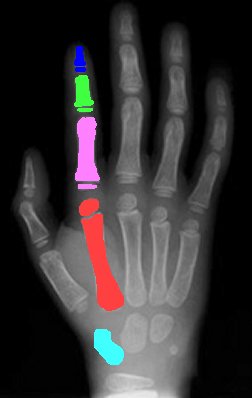Paediatric Hand Overview
 |
Links in imageClick on area of interestUse index finger for phalanges Use Middle finger for joints (Coloured areas have information.) |
Important points regarding hand and carpal fractures
- The most important thing to assess is the hand/ finger function.
- Look for and exclude any rotational deformity.
- Scaphoid fractures may not be evident on the initial radiograph, get scaphoid views. If initial radiographs are normal but clinically you suspect there is a scaphoid fracture. Treat as for scaphoid fracture and repeat radiographs 2 weeks later.
- Thumb metacarpo phalangeal injuries look for the rupture of the ulna collateral ligament.
Anatomy
Most fractures
of the hand in children involve the growth plate in the zone of hypertrophy.
NB growth plates exist only in the proximal end of phalanges, the proximal end
of the thumb metacarpal, and the distal end of the finger metacarpals.
Anomalies do exist, and an epiphysis or pseudoepiphysis must be ruled out when considering fractures in the paediatric hand.
Salter Harris Classification
- Only growth plate
- Through metaphysis and growth plate
- Epiphysis and the growth plate
- Through epiphysis and growth plate and metaphysis
- Crush injury of the growth plate
All SH fractures can lead to growth disturbance, but that SH IV and V fractures are at increased risk.
References
Common pediatric hand fractures; C Nofsinger: Curr Opin Pediatr, Volume 14(1).February 2002.42-45